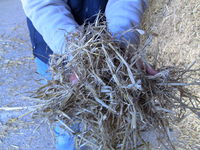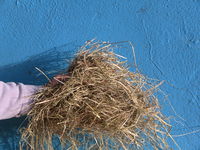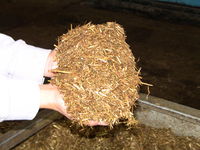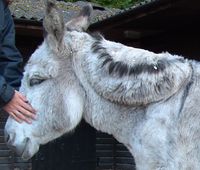Feeding Donkeys - Donkey
| This article has been peer reviewed but is awaiting expert review. If you would like to help with this, please see more information about expert reviewing. |
Feeding Donkeys
Donkeys have evolved to survive in some of the most inhospitable parts of the world, and are adapted to live in mountainous, desert areas. They are extremely efficient at digesting fibrous, poor quality plant material and have evolved as browsers (eating woody shrubs and trees) as well as grazers. Donkeys and their hybrid offspring, mules, are able to thrive on rations that horses could not. The donkey’s superior digestive ability makes them ideally suited to hard work in areas where food is of poor quality or is limited. However, donkeys and mules are also kept throughout the world as companion or leisure animals, in many cases food is freely available and owners struggle to replicate the natural, fibre rich diet of the wild donkey. Such over-feeding frequently leads to health issues including a propensity to obesity which increases the risk of related diseases such as laminitis.
Forage for Donkeys
Straw
Donkeys and mules have evolved to survive on highly fibrous forages that they would naturally graze and browse on whilst walking many miles per day over challenging terrain. Donkeys have a natural appetite of between 1.3 – 1.8% of their bodyweight (in dry weight); in order to avoid behavioural issues related to boredom it is important to satisfy this requirement by providing fibre throughout the donkey’s day. Satisfaction of this appetite without leading to weight gain is often challenging for sedentary donkeys and mules who do not work or who work only lightly. Donkeys are able to extract more energy from food sources than are horses and feeding donkeys freely on unrestricted temperate grasses and hays will undoubtedly lead to obesity. The most appropriate source of energy and dietary fibre for fit donkeys with good dentition are cereal straws (cereal stalks remaining after the grain has been harvested). Straw (barley, oat or wheat) is a forage which is high in fibre and low in energy and allows the donkey to satisfy his natural appetite whilst not oversupplying energy.
For most donkeys and mules living in temperate climates like the UK straw should form the majority of the diet. Straw can be fed from the floor or hay nets and should be freely available at all times for animals with good dentition. Straw provides fibre and limited nutrients to the diet but does need supplementation to ensure protein and vitamin and mineral levels within the diet are optimal.
Straw for donkey feeding
Hay/Haylage
Donkeys may require dietary supplementation with hay or haylage during the winter or when pregnant, lactating or growing in order to supply extra energy. Hay or haylage for donkeys must be selected carefully as forage made for horses or other livestock is often too rich and may lead to dietary upset or laminitis. Hay or haylage should be late cut, high in fibre, low in sugar and will be visibly coarse. High fibre haylage may be appropriate for donkeys when late cut hay is not readily available as sugar levels are reduced through partial fermentation. Donkeys are able to thrive on hay or haylage with low energy and high fibre levels but physical quality should not be compromised on. Dusty or mouldy forages should be strictly avoided as they may put the donkey at risk of respiratory disease or colic. Pregnant or lactating donkeys should be provided with ad-lib hay or haylage during the last trimester of pregnancy and the first 3 months of lactation. Donkeys during the winter should not require more than 25-50% of their forage by weight to be comprised of hay / haylage, meaning that 50-75% of their fibre should still come from straw.
High fibre haylage for donkey feeding
Grazing for Donkeys
Donkeys are poorly adapted to a life grazing on lush, green pastures such as those commonly found in the UK. Time at pasture provides welcome opportunity to exercise, socialize and, of course, eat but care must be taken to manage grazing for donkeys. When grass is actively growing (March – October) grazing will need to be strictly controlled to reduce the quantity of grass eaten through strip grazing, rotation of small pastures, grazing with other species e.g. sheep or through yarding for part of the day. Grazing muzzles are not recommended for donkeys or mules.
Unproductive, traditional meadow type grazing is ideal for donkeys and allows them to sample a variety of plants, trees and shrubs. Generally an acre of land will provide ample year round grazing for a pair of donkeys and allows areas to be rested whilst other areas are grazed. Access to concrete yards, woodchip or sand areas is also extremely useful as donkeys can exercise without access to grass. Donkey carers need to manage pasture carefully with droppings being collected a minimum of twice per week, ideally daily, weeds should be controlled to maintain a healthy pasture and rotation with sheep is ideal. Donkeys should have access to straw whilst grazing, reliance on grass as a sole fibre source for donkeys will lead to obesity and may lead to behavioural issues such as fence chewing as the donkey seeks to satisfy its natural requirement for indigestible fibre.
Browse for Donkeys
Donkeys and mules are naturally browsers as well as grazers; they appreciate access to hedgerows and tree branches and will readily consume safe trees and shrubs. Provision of safe branches, twigs and logs will provide enrichment for donkeys experiencing restricted access to grazing. Safe shrubs and trees include hazel, ash, sycamore, hawthorn, apple, limited willow, alder, lime, poplar and gorse. Provision of such materials will help to ensure that fencing and stabling are not regarded as food items! Planting and encouraging a variety of donkey-safe shrubs and trees that can be coppiced will provide shelter as well as food and enrichment for your donkeys. Owners can be recommended to cut and offer branches to donkeys or if this is not possible they may purchase cut logs from known tree species.
Supplementary Feeding for Donkeys
Supplements to Provide a Balanced Diet
Donkeys receiving a diet of carefully selected straw, grass and / or hay may not require supplementation other than access to an equine specific mineral block. However, in many cases donkeys in the UK are fed a diet with restricted levels of protein, vitamins and minerals. Dried forages are particularly deficient in vitamins. Feeding large quantities of equine feeds in order to meet micronutrient requirements will encourage weight gain and related health issues. Experience at The Donkey Sanctuary has shown that the best way of delivering an optimal level of nutrition without promoting weight gain is to feed small amounts of a multi-supplement in a concentrated, palatable pellet such as TopSpec Donkey Forage Balancer which is designed to be fed with forage, avoiding the need to add excess calories to the donkey’s diet. TopSpec Donkey Forage Balancer is suitable for all donkeys over the age of 3 weeks and means that you can be sure that your client's donkey is receiving all the micronutrients required to stay healthy.
Supplementary Feeding for Donkeys
The vast majority of mature, healthy donkeys do not require additional feeds. When extra condition is required it is important to ensure that weight gain is gradual and feeding is based upon a fibre rich diet. Donkeys may require extra condition due to increased nutritional requirements such as during pregnancy or lactation, when working hard, when sick or when they have been inappropriately fed in the past. Elderly donkeys may also require extra condition as they can find chewing long fibre forages such as straw and hay difficult as their teeth deteriorate with age. In most cases the safest way to encourage weight gain in donkeys is to feed supplementary feeds based upon laminitic friendly, high fibre cubes (e.g. TopSpec Fibre Plus Cubes) and unmolassed or thoroughly soaked and rinsed sugar beet; the addition of TopSpec Donkey Forage Balancer will ensure that the donkey is receiving adequate micronutrients. In cases where donkeys are sick or extremely underweight other balancer products may be more appropriate, please see these Fact Sheets or seek advice from The Donkey Sanctuary nutrition team.
Elderly donkeys with dental problems may struggle to eat long fibres; to maintain a healthy digestive tract and natural behavior it is important to provide an alternative fibre source. Trickle feeding of donkey friendly, short chopped, chaff products throughout the day encourages the donkey to maintain natural feeding behavior and should assist with maintaining a healthy body condition. Chaff products should be soft, laminitic friendly with low sugar levels and should be safe for feeding as a sole diet, the addition of an appropriate balancer will ensure the donkey is receiving adequate nutrients. The base diet of short chop can also have additional fibre rich products added if further condition is required. When chaff can no longer be adequately chewed a complete feed of soaked fibre cubes and an appropriate balancer may maintain quality of life for an extended period.
Short chopped chaff for donkey feeding
Feeding Sick Donkeys
Lack of appetite is one of the most common signs that a donkey is ill. Donkeys are naturally very stoic and do not show such overt signs of pain as other equines, often the first sign of a problem is a donkey that suddenly becomes anorexic or whose appetite is reduced. Any donkey with a poor appetite should be seen as a matter of urgency, donkeys that are completely anorexic should be treated as a veterinary emergency. Donkeys are particularly prone to developing hyperlipaemia.
Sick donkeys often need their appetite stimulating, although molasses, polos, cereal mixes and ginger biscuits can be used successfully in the very short term they can be detrimental for anything more than a day or two. Most donkeys can be tempted with healthier products such as TopSpec Digestive Aid, peppermint cordial, dried or fresh mint leaf, ginger, grated or chopped carrots, apples and bananas (including the skin) and yeast extracts such as marmite. Tempting the donkey with small, tasty feeds rather than one big meal is also recommended. It is important not to under estimate the donkey’s natural instinct as a browser. Donkeys that have shown no interest in tasty mixes will often be tempted to eat if led to a nearby hedgerow to browse on the brambles and herbs available, this natural instinct can often be used successfully in the worst of cases.
Overweight Donkeys
Perhaps the biggest welfare issue for UK donkeys is their propensity to obesity when fed high energy diets coupled with the fact that very few are worked. Health problems seen in UK donkeys are commonly caused by overfeeding and lack of exercise. It is essential to keep donkeys in a healthy body condition as unfortunately solving the problem of overweight donkeys is a very difficult task. Dieting an overweight donkey is extremely difficult and is an issue that needs to be tackled from many angles. The diet of the animal is often only part of the problem with lack of exercise, companion issues and mental stimulation all needing to be addressed as well. In the case of obese donkeys and mules grazing must be very tightly restricted by strip grazing and owners should be guided more by reducing the area of land the donkey has available than the grass (or lack of) that they can see. Obese donkeys need nothing more than ad lib straw with very limited grazing in the summer and straw with limited hay in the winter. It is essential to supplement such a restricted diet with a multi-supplement such as TopSpec Donkey Forage Balancer to ensure that the diet is not deficient in vitamins and minerals. In order to help donkeys lose weight they must be exercised and encouraged to work for their food; ridden or in hand exercise is ideal, where this is inappropriate other methods can be employed. Donkeys can be encouraged to ‘work’ for their food by using sloping pastures, placing feedstuffs in different locations (i.e. spread in 4-5 different locations in the field), hiding small pieces of chopped carrot in the bedding, providing stable toys and employing track strip grazing areas. Invariably the key to dieting donkeys is to encourage more activity and to stimulate their minds; all of the above methods of environmental enrichment can be used in tandem with dietary restriction to encourage weight loss.
Extremely large crest fat pad
It is extremely important when dieting donkeys to make feed changes gradually and to monitor them closely. Donkeys should be either weighed or condition scored weekly and records kept of their heart-girth measurements (charts for weight estimation and body condition scoring are available from The Donkey Sanctuary). Progress when dieting donkeys is slow and perseverance is very important, it often takes time for the first amounts of weight to be lost, however once this process begins weight loss should be gradual and not excessive. It is essential to know when it is time to stop dieting, donkeys store fat in very different areas to that seen in horses and invariably these fat pads (often seen on the crest, rump and flanks) do not disappear completely despite the animal being in an ideal condition. Although it is a difficult task, dieting donkeys gradually to attain a healthy body condition will have physical and psychological benefits for the animal and will almost certainly lead to the donkey’s life expectancy being extended.
Further Advice
Donkeys are a unique species that cannot be managed like other equines. They require specific diets, healthcare and daily care. Further guidance and resources on donkey care and welfare can be provided by The Donkey Sanctuary; the world’s largest donkey and mule charity working to improve welfare worldwide.



